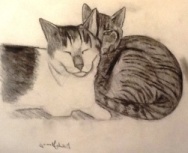
My cat is having trouble urinating – Seattle veterinarian’s advice.
Denali is a very sweet boy kitty about 5 years old who presented with a very common problem in cats. He first went to Animal Critical Care and Emergency Services when his owner noticed that he was having trouble urinating and moving in and out of his litter box. There was a concern that his urethra was blocked due to a bladder stone or mucus plug.
If a cat is having trouble urinating it can be a very big emergency. A blockage of the urethra causes the bladder to enlarge with urine and an eventually rupture or cause severe kidney damage. This problem is more common in males who have a longer urethra than female cats but female cats are not exempt from this issue.
Luckily, at ACCES, the doctor was able to make Denali urinate on his own by applying a little pressure to his bladder. His urethra was not blocked but there was something bothering him. Denali came to Hawthorne Hills Veterinary Hospital the next day where our Seattle veterinarians took x-rays of his abdomen to rule out bladder stones. His x-rays appeared normal and he was diagnosed with Feline Idiopathic Cystitis. This means that his bladder was inflamed and irritated without a specific reason that we can find. We don’t know what causes the inflammation so diagnosis and treatment can be difficult.
First we have to rule out other causes for difficulty urinating. We check the urine for crystals or bacteria. We take x-rays to look for bladder stones. Sometimes bloodwork is helpful to rule out kidney disease or other systemic problems. If all of this is normal then we are left with a diagnosis of Feline Idiopathic Cystitis.
Treatment for an acute episode of cystitis means controlling pain and discomfort. Pain medications and a medication called Prazosin are helpful for this. Prazosin helps relax the muscles of the urethra so urinating is not so painful. The most important part of treatment is getting and keeping the cat hydrated. This usually involves fluid administration either through an IV line or subcutaneously under the cat’s skin. To keep Denali hydrated and decrease the chance of recurrent episodes, we changed his diet to a canned food. Because we can lead a cat to water but cannot make him drink, this is the most effective way of increasing their water intake. Denali may have to be on a canned food diet for the rest of his life to keep his urinary tract happy and healthy.
It took a few days of medication and rehydration but Denali was back to normal within the week. Denali’s owners must always be watchful of problems in the litter box. They are also trying to decrease his weight and stress level as both of these things can be associated with a recurrence of inflammation.
Feline Idiopathic Cystitis or FIC can be a very confusing and scary disease. Please read more at this website so that you will be able to tell if your cat is in trouble: Click here to read more!



